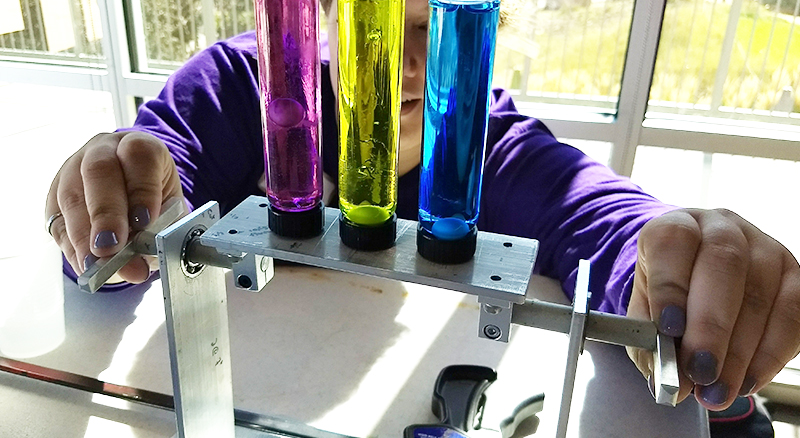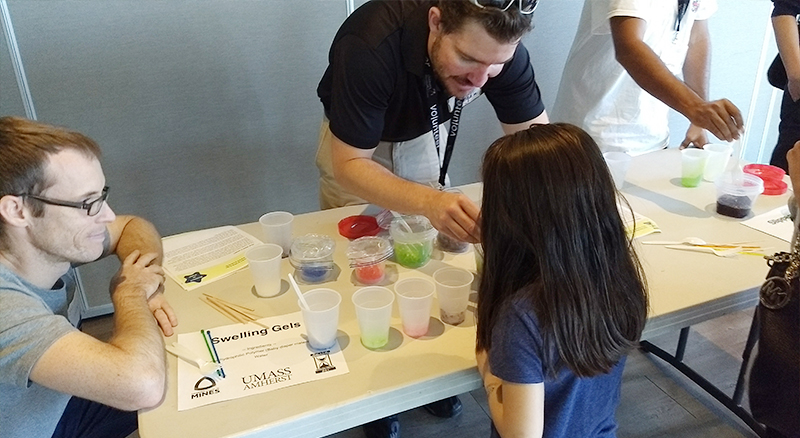The Society of Rheology Outreach Event
Winter
2018
Meeting Notes - SPS Reporters at Science Conferences
The Society of Rheology Outreach Event
Keegan Karbach, SPS President, Metropolitan State University of Denver

In early October, we had the wonderful opportunity to do a children’s outreach event in conjunction with The Society of Rheology at the Denver Children’s Museum. This was a multichapter partnership, with three SPS chapters represented: the University of Colorado, Denver, the Metropolitan State University of Denver, and the University of Denver. There were approximately 15 members of The Society of Rheology who came in from around the world as well.
We set up a variety of different demonstrations of nonintuitive fluid mechanics, targeted at kids ages 5–12. These demonstrations consisted of a variety of non-Newtonian fluids that had unusual physical properties intended to challenge the children’s intuition. We had hydrogels, slimes, oobleck, and even silly putty. We were a popular attraction inside the museum, with approximately 150 children and families coming through and looking at the ten stations of hands-on demos.
Courtney Fleming and Phurba Sherpa (president and secretary, SPS CU Denver) were in charge of presenting the Weissenberg effect. The demo was comprised of a rod attached to a motor that would spin in a non-Newtonian fluid consisting of long-chain polymers which we described as “spaghettilike.” Common intuition would assume that the rod would simply stir the fluid, but the fluid actually begins to climb the rod instead. It was great sharing this counterintuitive result with the children. We explained the effect through an analogy of spinning a fork in spaghetti. They were all fascinated with the very long and thin strands of the fluid that could be formed with even the slightest contact. We described this with another noodle analogy where lifting one noodle would lift multiple if they were tangled. This was a great demonstration of how the microscopic structure of a fluid results in interesting macroscopic properties.
“I think teaching children to challenge their intuition at a young age will be very beneficial to their futures,” Sherpa said later, “and it was a privilege to have been a part of it.”
I was one of the members to go out into the museum proper to introduce the attending children to the physics demos. I took a cup full of multicolored saturated hydrogel crystals that the kids could hold and squish and play with. The kids’ eyes just lit up. I remember how much I loved to play with slime and stuff as a kid; I even did an elementary school science fair project with the same hydrogel crystals that I was showing the kids. This is a great way to introduce the next generation to the wonders of the world around them, and it was great to be there to help them do it!
A big part of these demos was giving the children the opportunity to interact with the fluids directly using plasticware and wooden sticks. This highlighted the inquisitiveness of the children and challenged them to try and explain what they were seeing in the demos. The Society of Rheology had instruction sheets printed for all of these demos that included easy-to-understand explanations that were geared towards younger children; these demos should be in every SPS chapter’s toolkit!
As the event wrapped up, we realized how much fun everyone had had. Sherpa said that not only did he think the kids enjoyed themselves, but he “definitely found [him]self having a blast finding different ways to play with the fluids, even when all the kids had left.” Now that’s a successful outreach event. //

Interested in hosting your own outreach event? Check out the SPS library of demos at www.spsnational.org/programs/outreach/demonstrations.
